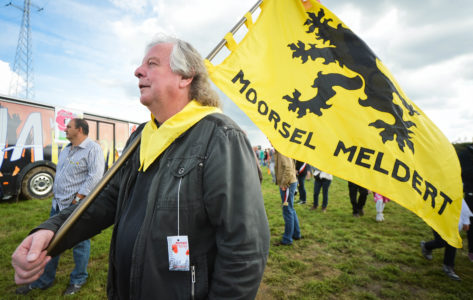I Want to Break Free!
Selected secessionist movements in the EU
 Former Scottish First Minister Alex Salmond campaigning for Scottish independence (The Telegraph)
Former Scottish First Minister Alex Salmond campaigning for Scottish independence (The Telegraph)
They say that everyone goes to court once in a lifetime. For countries, courts are often the place where they end up when sued for issues such as human rights violations, or end up as a result of a dispute, such as a border issue with the neighbouring country. However, if there is one special case a modern country has to go through, then it is the independence referendum. It is the way that many countries with a difficult past proclaimed their independence. One of them is my country, and my parents recall the event as something that they will remember forever. With a record turnout, people were taking the cause very seriously, putting on their best suit and arriving at the voting stations already in the early morning hours, having a sense that they were witnessing history.
However, last Sunday’s Catalonia independence referendum was everything besides elegant, decent or civilized. It could be said it was historical, but just because the Catalans will never forget it. As the whole world witnessed, it was a day full of horrible and violent scenes on the streets of Catalan cities, with almost 900 people injured in the clashes with the Spanish police, which has been sent to region exclusively for this issue. Without going into the question of self-determination, and evoking the concepts of the likes of Wilson or Lenin, I wanted to recall the Catalonian and other significant secessionist movements that have shaped EU politics so far.
Regarding Catalonia, these days it has been stressed quite often that the proud region is the economic motor of Spain, accounting for 20 percent of Spain’s GDP. Proponents of Catalan independence will not forget to remind you of this. The current pro-independence Catalan government secured the narrow majority after the 2015 regional elections, and since then, worked diligently to prepare the ground for the independence referendum, which the Spanish Constitutional court unanimously views as unconstitutional. Catalonia already enjoys a certain level of autonomy, by having their own civil guard, education and health. However, many are not happy that their taxes are being redistributed by Madrid, instead of Barcelona. And no victory over Real Madrid could cure that. Regarding the mainstream Spanish political parties, only the left-wing Podemos has shown an understanding on the referendum issue, but still opted for the unity of the country. The ruling Partido Popular is strictly against this issue, while the oppositional socialists would probably be only a little bit milder in the approach. A little bit.
In close-by Basque country, which is poorer than Catalonia, a certain left-wing nationalism movement has a historical influence in its regional politics. I have good memory of the news reports with masked ETA terrorists sitting under the Basque flag and taking responsibility for their violence. In their bloody days, they were responsible for many deaths, while their political wing, Batasuna, was officially banned. In 2011, ETA officially gave up their arms and therefore ended one of the longest and most infamous conflicts in the EU.
Recently I read in some Brussels guide that Belgium is a place where the Germanic culture meets the Latin one. Although that is per se a massive advantage for people living in this country, not only through knowing languages and growing up in a multicultural society, it can be a problematic issue, as witnessed in the legendary Belgian government formation some 10 years ago. The complex structure of the country, language divide and the politics of compromise have led to stronger calls for the division of the country between the Dutch-speaking Flanders and the French-speaking Wallonia, where there is also a small German- speaking society, which is regularly marginalized. The German-speaking leader Karl-Heinz Lambertz recently became the President of the European Committee of Regions, in a typically symbolical move. Flemish nationalists have also divided themselves in two turfs, with the more extreme ones hating themselves in the morning, and everyone else in the afternoon, while the moderate ones are pragmatically a part of the central government coalition.
On the other side of the North Sea, Scotland is a case that needs to be mentioned. By forming the Scottish Parliament as part of the New Labour agenda in 1997, Tony Blair, born in Scotland, thought he would solve the issue. However, through this Parliament, he opened the floor for the nationalist Scottish National Party, which advocates Scottish independence on a pro-EU and left-wing platform. It all culminated in 2014 with the Scottish independence vote which was approved by London, and independence was stopped only by the complete unity of all pro-UK political forces. Many Scots believed that they are better off alone due to the North Sea oil, and their specific cultural distinctions, not only manifested through bagpipes or kilts. They were discouraged by then-Commission President Barroso who sent them a message that they would have to apply for the membership to the EU, if they become independent. With Brexit happening in 2016, some hopes were raised that a new independence referendum would be brought up, as Scotland wants to stay in the EU. However, the recent general election result of the SNP, where they lost half a million votes and 21 seats, even to the Tories, somehow discouraged this idea.
For the end, there are two points I would like to stress. The first one is that we should adequately address serious secessionist movements, as the one in Scotland, by not putting them into the same basket as claims of marginal groups in some smaller part of Europe, whose influence culminates in a local tavern on a Saturday evening. Recent news articles which have been publishing the maps of European secessionist movements are something that is playing along that line, as no politically sensitive person can view Catalonia and for instance Sicily in the same view. Second of all, we need to be aware that problems and unhappiness of Catalonians or Scots are here to stay, and they will not disappear. Probably the best response to that was of the former European Parliament President Josep Borrell, a Catalan himself, who said that when he has a problem with his wife, he sends her flowers. I truly hope that some bouquets will be soon going in the direction of Barcelona.
 A Flemish nationalist in Ypres/Ieper, Belgium (New Europe)
A Flemish nationalist in Ypres/Ieper, Belgium (New Europe)
